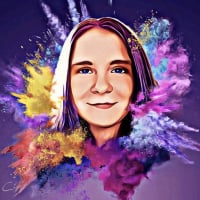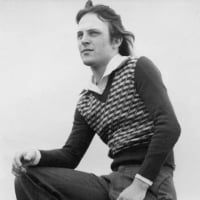New Diagnosis, New Lifestyle. Old Me: Embracing a Reluctant Change
My name is Alexandra and I am a 3rd year Medical Student, training to be a Doctor, in Cardiff. A deafblind medical student, I am forever trying to shift the social perceptions and stereotypes that burden the topic of disabilities and chronic illnesses. Born both registered blind and hearing impaired, I have not let my disabilities restrict me from embracing the able-bodied world around me. I am an ex-sportsperson, having trained on the GB Team for 2 sports, swimming and skiing, I enjoy traveling the world solo, with my long white cane, and I blog about all my experiences above, drawing particular attention to how we can change outdated misconceptions on the role and criteria of ‘disability’. You can check out and follow my blog Setting Sights.
Growing up with 2 disabilities hasn’t let illness, limitation get in the way of achieving the things I want to achieve. In fact, being deafblind has given me opportunities and experiences that I perhaps wouldn’t have had if I wasn’t disabled. And I cherish that. But, maybe that’s because I don’t know any different – I don’t know what it’s like to have perfect vision, perfect hearing. I don’t know so I can’t compare. That’s when receiving a new diagnosis becomes an entirely different concept altogether.
In the past 2 years, I’ve had 14 admissions to Intensive Care. In Summer 2018, I was diagnosed, with a myopathy, a mitochondrial disorder, that, with the slightest exercise or over-exertion, sends me into crisis, affecting multiple body systems. I quickly slip into respiratory failure, cannot keep down any foods or liquids, and am yet again, intubated, ventilated and commenced on enteral feeding.
Between each admission, my “blips”, weeks are piled upon more time, in a desperate attempt to regain weight, strength and normality. But it’s frustrating. Whilst adapting to a new diagnosis can feel debilitating, hopeless, especially in young people, it almost forces you to grow up faster, to instinctively take on more responsibility and awareness of your own health. I admittedly thought I was invincible, and as a young person, it’s only natural to feel this way. Only now, whilst my friends are heading out to socialise, I have to consciously weigh up the costs and prioritise – to go out with the girls, or stay indoors to recuperate? Or else I fall into a scarily fast decline again.

Not only does a new diagnosis bring new responsibility, realistic perspectives, but it also brings considerably more empathy. As a medical student, and future doctor, my new diagnosis has somewhat given me the ability to completely understand where my patients are coming from. They tell me that they can no longer do their usual hobbies, and that these daily limitations leave them lost and frustrated. I totally get it. I empathise. Yet now, I embrace those petty, little things so much more than I ever would, had I not had to revaluate my circumstances. Revaluate my life.
Having that confirmed, official diagnosis, can take months years, sometimes not at all. Complex, chronic, progressive illnesses are often rare, and blatantly misunderstood, unless you’re incredibly lucky to have the right team of doctors behind you. I am incredibly lucky. My consultants are concerned to find the answers, whilst knowing too well that I’m undergoing that shift into a new lifestyle – that lifestyle that adapts to this new diagnosis. But for those closer to home – family, friends, that new diagnosis can be even harder for them.
Whilst I’ve already found the leeway to accept this new illness and move on, my family remain restless and scared at the concept of me being ill. Becoming worse. Consequently, I find myself layered up in bubble-wrap that does nothing but limit me even more. Very quickly, we slide down the slope of becoming paranoid at every little thing you do, paranoid that you are being frowned upon for ‘going against’ the rules of your diagnosis.

Nonetheless, I’ve learnt that, actually, I don’t have to change what I do, or what I want to do. I just need to change how I do it and when I do it. Before, slowing down and putting life on hold seemed nothing but an act of failure in my eyes, and I continued to ignore my diminishing baseline where my health began metaphorically mirroring the peaks and troughs of a treacherous mountain range. Quite frankly, I want stability. As much as this illness can realistically take.
So although I can no longer swim, ski, or travel too far abroad, I am embracing these reluctant new beginnings and taking my final year of medical school part-time, over 2 years rather than 1, so that I can give my body the rest and recuperation it’s crying out for in between. And I’m doing this all whilst still being able to achieve all that I want to achieve. I don’t see my new diagnosis as cause for failure, a reason to give up, or a force to change me or who I am. I just have to juggle my lifestyle around a bit, and as time becomes the temporary healer, I am totally okay with that. Don’t discard your goals, your dreams, your life, just because a new diagnosis has got in the way. Adjust your priorities and seek new opportunities from those necessary lifestyle changes. It’s about acceptance now, acceptance with your new approach.
How then, will you embrace your new diagnosis?
Comments
-
Amazing post @Alexandra_Adams! I am awaiting tests to determine whether or not I have Mitrochondrial disease as, like yourself, I ended up in ICU a little over a year ago with respiratory problems/double pneumonia. Specialists are perplexed as I have improved whereas someone with Mitrochondrial would deteriorate.
I love your perspective too! I wish you all the best with graduating 3
3 -
a great posts from a very strong and determined woman, hope everyone could be as strong, as i'm weak compared to the solo stuff you have done, feeling at times a challenging is getting out of the door, let alone the country, so thanks for the post and wish you continued success at uni, and once trained would be nice to get you at a assessment, someone who does know how a given part of something feels, as empathy isn't or didn't happen at my last assessment, so good look on the Doctor training and in life in general3
-
2
-
3
-
How true. I found out a few years ago when I was almost 18 that I had dyscalculia. I chose to react positively to the diagnosis and focus on my strengths. Life is what you make of it. Sometimes I hate numbers but I remember that there are lots of things I can do independently. Off to take a look at your blog now. Mind if I share the post online?2
-
Thank you for all the lovely comments! I am glad I have been able to at least reassure people that receiving a new diagnosis, although undoubtedly difficult, doesn’t turn everything into an impossible. I’ve personally found that with self-motivation and the right support networks around you, the things you want to focus on become at least a little more doable. I just hope I can apply this approach with my future patients! And @April2018mom of course, no worries, go for it!2
-
@Alexandra_Adams, I can empathise with losing abilities. Until 2005 I was in fairly normal health and had won trophies (local) for sports (football, squash, 10 pin bowling, pool & darts). Initially I thought it was age causing the 'downsizing' of what I could do but in 2006 was diagnosed with 2 lumber disc partial collapse (this was after Cervical Spine surgery to rectify my issues supposedly). The condition is progressive and now the total is 1 new Cervical rupture and 9 or more Lumbar and Thoracic collapses leaving me pretty much confined to a recliner chair 95% of the day or more. Not only do most people not understand it over 90% of the health professionals have no idea about what it is or how to treat it. Having no name also gets me no respect from almost everyone I have met since it started affecting me badly as it's invisible. Also, having an IQ of 159 stuck inside a body that is non-functional is causing me serious Mental Health issues. My mind is literally being destroyed just so these so-called Health Professionals can keep me alive.
TK1 -
Thank you for sharing such a positive, upbeat message, Alexandra. You are living your belief in that message.
I had been misdiagnosed for decades and it wasn't until I moved into the severe stage of Lupus I was correctly diagnosed. Others aren't so fortunate, I've lost a few good friends to SLE. Thankfully, with the help and support from an excellent specialist and nurse I survived to tell the tale. It has left the connective tissue badly damaged, including kidneys and gastrointestinal problems plus my mobility very reduced.
The condition is rare and I know many doctors and health professionals don't see many SLE patients if any in their career but for those of us how have it, the sooner we are diagnosed and treated, the better.
What I can do is spread awareness, poor mobility isn't an issue online, in blogs, in posts. One of the nicest things someone said to me is that I haven't lost my sense of fun or humour., they get me through the day as does having plans, having goals.
I've had ther Lupus patients telling I'm so lucky, but my attitude is achieved by effort rather than luck. Clinical depression hit me hard a while back and having come out the other side have vowed never to go back there.
So many people out there are living with illnesses and conditions, many are invisible. If someone makes comments about me going slowly, using a blue badge in the car but not in a wheelchair I used to get angry and upset, now I use the opportunity to educate. If they still comment, then I move on. Some people will be judgemental no matter what. Being upset only wears me out and I have better use for my energy, enjoying life.
I salute all of you out there working so hard to get through each day, you are made of tough stuff.
0 -
What a good post. Thank you for sharing. Netty0
Categories
- All Categories
- 15.1K Start here and say hello!
- 7.1K Coffee lounge
- 84 Games den
- 1.7K People power
- 116 Announcements and information
- 23.9K Talk about life
- 5.6K Everyday life
- 348 Current affairs
- 2.4K Families and carers
- 863 Education and skills
- 1.9K Work
- 512 Money and bills
- 3.6K Housing and independent living
- 1K Transport and travel
- 876 Relationships
- 254 Sex and intimacy
- 1.5K Mental health and wellbeing
- 2.4K Talk about your impairment
- 859 Rare, invisible, and undiagnosed conditions
- 920 Neurological impairments and pain
- 2.1K Cerebral Palsy Network
- 1.2K Autism and neurodiversity
- 38.9K Talk about your benefits
- 5.9K Employment and Support Allowance (ESA)
- 19.4K PIP, DLA, ADP and AA
- 8K Universal Credit (UC)
- 5.6K Benefits and income






